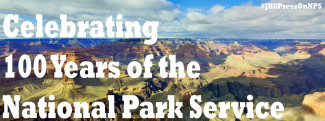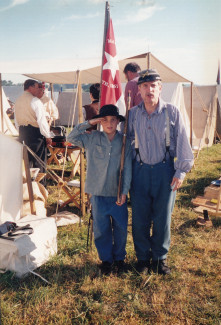
Johns Hopkins UniversityEst. 1876
America’s First Research University
A Shot in the Park

The National Park Service (NPS) celebrates its centennial anniversary in the month of August! NPS has served as a valuable resource for many of our authors, both professionally and recreationally. To commemorate the occasion, our authors have taken to the blog to pay homage to “America’s best idea”! Check back with us throughout the month of August for more #JHUPressOnNPS! (Series photo credit: Wikimedia)

By Charles W. Mitchell, author of Travels through American History in the Mid-Atlantic: A Guide for All Ages.
When my son was eight years old, I took him to a national park and he got shot in the pancreas.
The incident occurred at Gettysburg National Military Park, where I, a travel writer, was embedded with a Confederate artillery unit at a restaging of the 1863 Battle of Gettysburg. My task that weekend was to entice readers to the park by describing the battle through the eyes of a man who’d actually fought there—an unorthodox way, my editor and I agreed, to write of a place that had been written about to death. I’d read letters and diaries of those who had battled during those brutal first three days of July, so I gladly joined the encampment and set about putting myself in an 1863 frame of mind and preparing for our reenactment of Pickett’s Charge.
The resulting travel story, and others over a six-year span for a large metropolitan paper, gave rise to my subsequent book, Travels Through American History in the Mid-Atlantic: A Guide for All Ages (Johns Hopkins University Press). Watching our kids climb onto the wooden bunks in the log huts at Valley Forge, chase prisoners who’d fled their jail cells inside Fort McHenry, and trace the movements of John Brown’s raiders as they launched their raid on Harpers Ferry helped illuminate for them a few historic cornerstones of our nation. These experiences, and others from staggeringly beautiful national parks of the west, are gently embedded in our collective family memory.
Back in our camp at Gettysburg, a cavalry detachment rides slowly along the tree line, eyeing enemy pickets in the distance. Small boys, clad in period homespun and straw hats, race about the camp, then stop to watch the cannon crew assemble charges of black powder and peat moss wrapped in aluminum foil—soon to feed the big guns that will shortly open up on the Union lines. Other soldiers clean muskets, whittle, peel potatoes, play chess and cook breakfast over open fires. The powder monkey carries the charges to the limber behind the line of cannon.
It’s hot. Really hot, as it was in early July 1863. My wool uniform chafes. We take our positions on the cannon. On command our artillery opens up. The Rebel infantry steps out of the woods at the base of Seminary Ridge and begins marching toward a copse of trees a mile away, where men in blue await. Those men fire. Rebels fall. One survivor of Pickett’s Charge prosaically recalled the “glittering forest of bayonets” and the “rustle of thousands of feet amid the stubble” of the open, mown fields.
My aforementioned son, Alec, is a flag bearer behind the lines; ever the showman, he goes sprawling. As he’s dragged from the field, an officer asks where he’s been hit. “In the pancreas, sir!”
How can a father forget such a thing?

Charles W. Mitchell is the author of Maryland Voices of the Civil War and Travels through American History in the Mid-Atlantic: A Guide for All Ages, both published by Johns Hopkins University Press.


